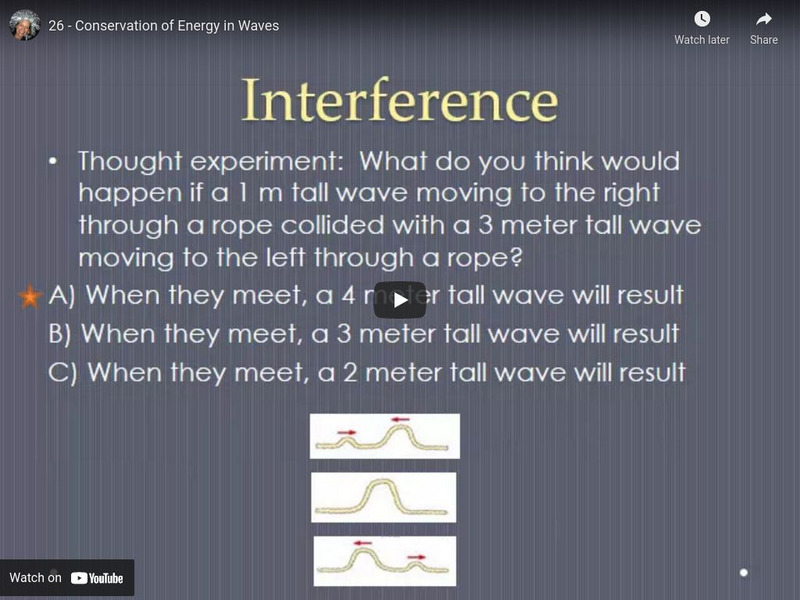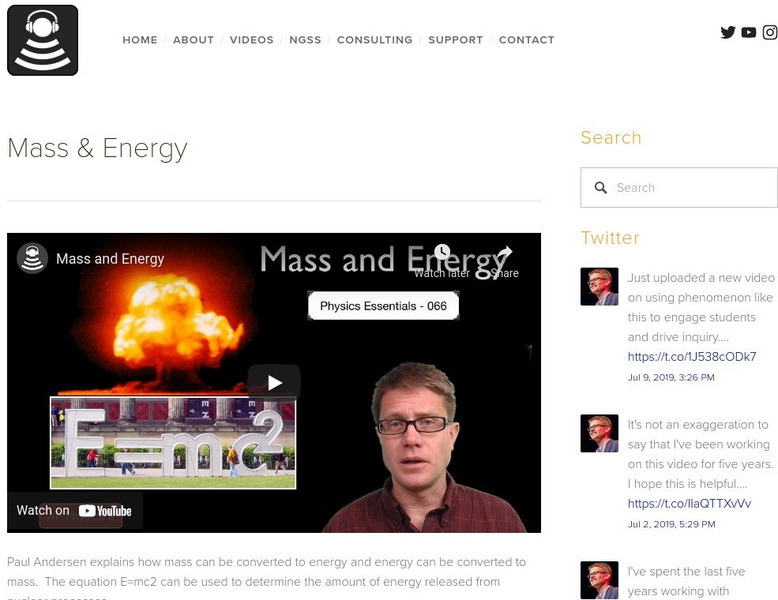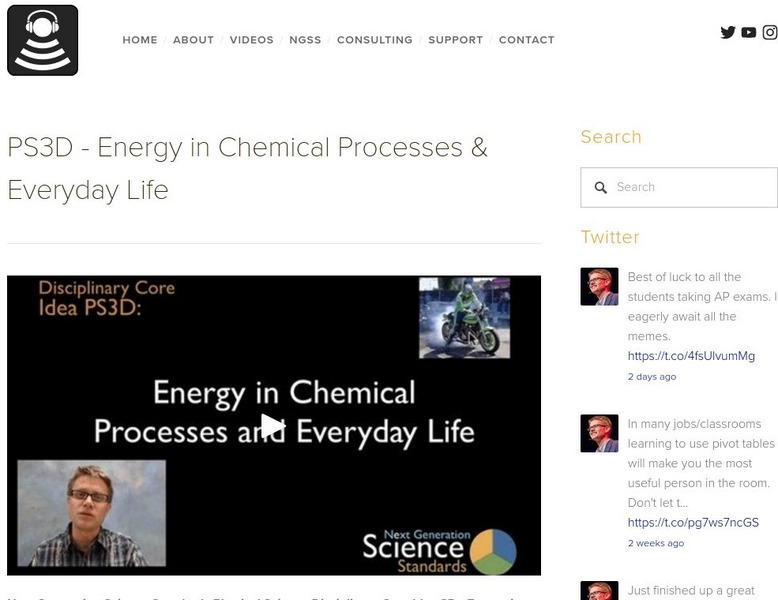Curated Video
Energy Conversions
2 minute video describing the Law of Conservation and how energy can change forms for middle school science
Curated Video
Transducer
A device that converts one form of energy into another. A Twig Science Glossary Film. Key scientific terms defined in just 60 seconds using stunning images and concise textual definitions. Twig Science Glossary Films reinforce abstract...
Flipping Physics
Electric Power
In this video, we learn about and derive equations for electric power using Ohm's law. We explore the relationship between electric power, electric potential difference, electric current, and resistance. We also discuss the unit of...
Visual Learning Systems
Energy Review
This video reviews the topics covered in the Energy series. In this series, we explore the various forms of energy, including mechanical, nuclear, heat, chemical, and electromagnetic energy. We delve into the concepts of kinetic and...
Visual Learning Systems
Understanding Cell Functions
In this video, the teacher discusses the important functions carried out by cells. They mention the conversion of food into energy, the exchange of materials inside and outside the cell, and the creation of new cells through...
Visual Learning Systems
Energy Quiz
This video is a quiz over the topics covered in the Energy series. In this series, we explore the various forms of energy, including mechanical, nuclear, heat, chemical, and electromagnetic energy. We delve into the concepts of kinetic...
Visual Learning Systems
Introduction to Energy
This video introduces the Energy series. This series of videos describes the five main forms of energy and how to differentiate between them. Students will learn about potential and kinetic energy. Everyday examples illustrate how we...
NASA
STEMonstrations: Kinetic and Potential Energy
A roller coaster is the perfect model of the conversion between potential and kinetic energy. An installment from the STEMonstrations playlist introduces the concept of kinetic and potential energy in a quick video before challenging...
PBS
Energy Defined
What is energy, and why do we need so much of it? Scholars explore the definition of energy as it relates to both conversion and consumption with a video and discussion questions. Part of an energy unit from NOVA, the resource provides a...
PBS
Putting Energy to Use
From burning wood for heat to riding a bicycle, converting one form of energy into another is an everyday process! Using a video clip, learners discover the sources of the thermal, mechanical, and electrical energies that make our lives...
Bozeman Science
PS3D - Energy in Chemical Processes and Everyday Life
Need to take your teaching of energy concepts to another level? Check out a strategic video that examines standard PS3D in the Next Generation Science Standards. Filled with examples, scenarios, and connections to the life sciences, the...
DoodleScience
Gravitational Potential and Kinetic Energy
What are the factors that affect the gravitational potential energy? Use the video to describe the process of calculating GPE and how it is converted to kinetic energy.
DoodleScience
Energy Transfer and Efficiency
Offering more than just light, a lamp can serve a dual purpose as a heater. The video shows that a lamp converts electricity to light and heat energy. Although the purpose of the lamp is light, most of the energy is in the form of heat....
Massachusetts Institute of Technology
Mit: Blossoms: The Mystery of Motion: Momentum, Kinetic Energy & Conversion
In this video lesson, the concept of momentum applied to hard-body collisions is explained using a number of simple demonstrations, all of which can be repeated in the classroom. Understanding Newton's Laws is fundamental to all of...
Massachusetts Institute of Technology
Mit: Blossoms: Thermodynamics: Energy Conversion in Generating Electricity
This lesson is an introductory topic in thermodynamics, on the conversion of energy. The aim of this video is to support students in visualizing the conversion of energy and its importance in real world applications. [24:07]
Khan Academy
Khan Academy: More on Internal Energy
Calculating work using the first law of thermodynamics. [13:45]
Khan Academy
Khan Academy: Calculating Internal Energy and Work Example
Example of calculating energy using the First Law of Thermodynamics. [7:14]
Annenberg Foundation
Annenberg Learner: Science in Focus: Energy: Energy in Cycles
Video workshop explores the everyday activities, such as walking, running, or playing a stringed instrument, that generate energy cycles, as well as the reasons energy cycles diminish and the ways to keep them sustained. [58:20]
Other
Conservation of Energy in Waves
High school teacher Kate Nichols explains that wave energy is equal to the amplitude of a wave. Looks at different scenarios where we may notice that wave energy is being conserved or not. The conversion of wave energy into another type...
Bozeman Science
Bozeman Science: Mass and Energy
In the following video Paul Andersen explains how mass can be converted to energy and energy can be converted to mass. [3:30]
National Science Foundation
National Science Foundation: Science of Speed: Car Safety
Conservation of energy explains how this NASCAR race car driver was able to walk away from a horrific crash in 2008. See how the design of the car enabled it to absorb and transform kinetic energy, and protect the driver from injury. [5:30]
PBS
Nova Labs: Putting Energy to Use
Energy comes in many different forms. It can be stored in the chemical bonds that hold molecules together, carried in the motion of a spinning wheel, or held in a boulder sitting on a cliff. But energy isn't a fixed thing. In fact, we...
Bozeman Science
Bozeman Science: Energy in Chemical Processes & Everyday Life
In this video, Paul Andersen explains how energy is used in chemical processes and everyday life. Students should understand that energy is neither created or destroyed but is converted. Most of the energy is delivered to our planet from...
















